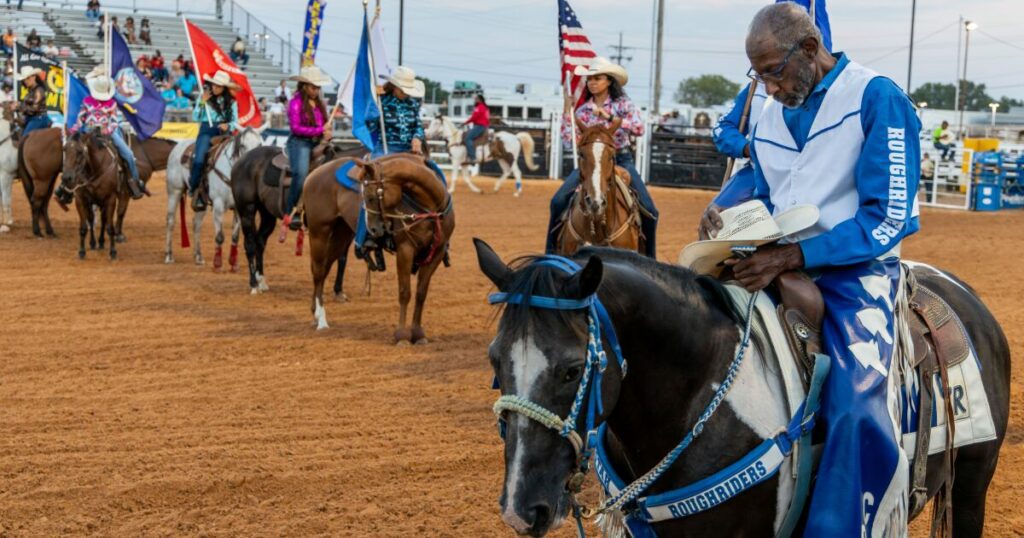The crowd inside the rodeo arena gets loud and the red dirt kicks up in clouds as teams of horseback riders race around barrels and pass a baton.
The Pony Express event is a staple here, where teams of eight compete and the first to drop the baton in the center barrel wins.
Aaron Foster and the rest of his team, the A-State Regulators, are dressed in matching bright green cotton button-down shirts. While the team competes nearly every weekend in the summer, Foster said they practice for this — the Roy LeBlanc Okmulgee Invitational Rodeo — all year.
“The most important part is there are Black cowboys and we do this too. We were the first cowboys.” Foster said. “It’s a different feeling competing out there; it’s something about it. It’s like history.”
A-State Regulators team members sit on their horses at the Bob Arrington Rodeo Arena Fairgrounds. They compete in the Pony Express event at rodeos nearly every weekend in the summer, but Aaron Foster said the Okmulgee invitational is special. “The Okmulgee Rodeo, this is it. This is what we’ve been practicing for all year. This is the big one,” he said.
The Roy LeBlanc Okmulgee Invitational Rodeo is the oldest and largest continually-running Black rodeo in the nation. Held for two nights in early August at the Bob Arrington Rodeo Arena in Okmulgee, Oklahoma, it includes a variety of rodeo events from bull riding, calf roping, and steer wrestling to the Pony Express, ladies steer undecorating and junior barrel racing. Hundreds of competitors and fans attended again this year, the 69th annual event.
“My dad, my grandfather and about 22 other guys, they started the Okmulgee County Roundup Club in 1956,” said Kenneth LeBlanc.
The white rodeo held at Okmulgee at that time didn’t allow Black cowboys to compete in the main rodeo or to sit anywhere but in the “Colored Section.” So LeBlanc’s grandfather and the rest of the group decided to create a roundup club, which was an open rodeo. Eventually, it became an invitational Black rodeo and when the founders became older, LeBlanc said his dad kept the rodeo going.
“Then when he passed, I started to coordinating and running and things like that,” LeBlanc said. “So yeah, hopefully my kids will keep it going.”
Pony Express teams ride in a relay race on the first night of the rodeo. Although there’s a long legacy of Black cowboys and cowgirls, LeBlanc said some people still might be unaware of it.
People from around the country are drawn to the annual rodeo, along with its parade and festival.
Leroy Patterson Jr., who was originally from Boley, Oklahoma, came all the way from California.
“Look at all the people around, especially the young folks. We have some great athletes out here, young men and young women. So, I come back to support them,” Patterson said.
Patterson started riding bulls at 35-years-old in his hometown, which happens to have the oldest African-American community-based rodeo, and he also competed at Okmulgee. During this Okmulgee rodeo, Patterson said he would be behind the bucking chutes with the bull riders, because he rode with many of their uncles, fathers and grandfathers.
Kids also are a big part of the rodeo with events such as junior barrel racing, junior breakaway, and mutton busting — a competition where children ride sheep and try not to fall off.
Anna Pope
/
Harvest Public Media
It was Carter Henderson’s first time competing in a mutton busting event. Henderson and his dad paused for photo after stepping out of the arena.
Eight-year-old Carter Henderson came from Ashdown, Arkansas, to compete.
“I told my daddy at the Black rodeo in Texarkana, ‘Please let me do mutton busting,’” Henderson said. “They couldn’t sign me up. So I did this one.”
Henderson held on to the sheep as it bolted from the chute. The judges awarded him 81 points for his ride, landing him sixth place. He was grinning as he slid off the sheep at the end of his ride.
“I guess the mechanical bulls helped me,” Henderson said.
When the mutton busting competition ended, more people situated themselves in the stands. Soon after, cowboys and cowgirls filled the arena in the rodeo’s grand entry.
Cheyenne Williams, 19, traveled from Houston, Texas, to compete in the ladies steer undecorating. In the event, a steer runs from its chute, and a horseback rider catches up to the steer then reaches down to remove tape or ribbon off the animal.
Cheyenne Williams is interviewed by Harvest Public Media reporter Anna Pope. Cheyenne said she’s at a different rodeo almost every weekend. “I try to stay focused as much as possible so I can lock in and be able to win some money,” she said.
Williams started participating in the event in 2021 but said she’s been running barrels all her life. Rodeoing is in her bloodline.
“My mother, she also does ladies steer undecorating and she runs barrels also,” Williams said. “My dad, he’s a calf rider. My grandpa, he was a steer wrestler, a bronc rider, a bull rider, a calf roper. And my brothers, they rode calves.”
For Williams, what makes the Okmulgee invitational special is that it has been going on for years and continues to grow.
“I love the history of the event coming from this being a Black rodeo, and we get to compete,” Williams said. “Back in the day, they didn’t see us as real cowgirls and cowboys, and to be able to represent that in the present year 2024.”
This story was produced in partnership with Harvest Public Media, a collaboration of public media newsrooms in the Midwest. It reports on food systems, agriculture and rural issues.
Source link : http://www.bing.com/news/apiclick.aspx?ref=FexRss&aid=&tid=66cc46c1977a4382bbec510464b7b410&url=https%3A%2F%2Fwww.northernpublicradio.org%2F2024-08-26%2Fblack-okmulgee-rodeo&c=6272640967569439080&mkt=en-us
Author :
Publish date : 2024-08-25 22:00:00
Copyright for syndicated content belongs to the linked Source.
